The Railway Recruitment Board (RRB) has announced the exam dates for the RRB Paramedical Staff Exam 2026 through an official Notice. So, candidates preparing for RRB Paramedical 2026 need to gear up their preparation as the exam is highly competitive. One of the most effective strategies to excel in this exam is by solving RRB Paramedical Staff Previous Year Question Papers, as they provide valuable insights into the exam pattern, frequently asked questions, and topic-wise trends.
RRB Paramedical Staff Previous Year Question Papers
As per the latest notification released by the Railway Recruitment Board, the CBT exam Date for RRB Paramedical 2026 is notified to be 10th March 2026. For aspirants gearing up for the next RRB Paramedical 2026 recruitment cycle, practising with RRB Paramedical Previous Year Question Papers (PYQs) is more than just revision – it’s a smart strategy.
These papers highlight the difficulty level of different shifts of the RRB paramedical Exam, and show which topics are repeatedly tested across posts like Nursing Superintendent, Pharmacist, Lab Technician, and others. Unlike mock tests, PYQs are based on the actual exam questions set by RRB, making them one of the most reliable resources for preparation.
Reviewing the RRB Paramedical Staff Previous Year Question Papers will strengthen aspirants’ preparation and improve their chances of clearing the exam. By familiarising themselves with the exam format and question types, aspirants can tailor their study strategies more effectively. Aspirants can download the PDF of the Previous year’s Question Papers for the RRB Paramedical Staff exam using the link provided below.
| RRB Paramedical Staff Previous Year Question Papers Download PDF | ||
| Paramedical Staff Previous Year Question Papers 2025 | PDF Link (English) | PDF Link (Hindi) |
| RRB_Paramedical_28-04-2025_Afternoon_Shift_HEALTH-and-MALARIA-INSPECTOR-GRADE-III | Download PDF | Download PDF |
| RRB_Paramedical_28-04-2025_Afternoon_Shift_PHARMACIST-ENTRY-GRADE-2 | Download PDF | Download PDF |
| RRB_Paramedical_28-04-2025_Evening_Shift_LABORATORY-SUPERINTENDENT | Download PDF | Download PDF |
| RRB_Paramedical_28-04-2025_Evening_Shift_PERFUSIONIST | Download PDF | Download PDF |
| RRB_Paramedical_28-04-2025_Evening_Shift_PHARMACIST-ENTRY-GRADE-2 | Download PDF | Download PDF |
| RRB_Paramedical_28-04-2025_Morning-_Shift_FIELD-WORKER-1 | Download PDF | Download PDF |
| RRB_Paramedical__29-04-2025_Evening_Shift_OCCUPATIONAL-THERAPIST-2 | Download PDF | Download PDF |
| RRB_Paramedical_30-04-2025_Afternoon_Shift_DIALYSIS-TECHNICIAN | Download PDF | Download PDF |
| RRB_Paramedical_30-04-2025_Afternoon_Shift_ECG-TECHNICIAN | Download PDF | Download PDF |
| RRB_Paramedical_30-04-2025_Afternoon_Shift_LABORATORY-ASSISTANT-GRADE-II | Download PDF | Download PDF |
| RRB_Paramedical_30-04-2025_Afternoon_Shift_OPTOMETRIST | Download PDF | Download PDF |
| RRB_Paramedical_30-04-2025_Evening_Shift_PHYSIOTHERAPIST-GRADE-II | Download PDF | Download PDF |
| RRB_Paramedical_30-04-2025_Morning-_Shift_CLINICAL-PSYCHOLOGIST | Download PDF | Download PDF |
| RRB_Paramedical_30-04-2025_Morning-_Shift_DIETICIAN-Level-7 | Download PDF | Download PDF |
| RRB_Paramedical_30-04-2025_Morning-_Shift_RADIOGRAPHER-X-RAY-TECHNICIAN | Download PDF | Download PDF |
| 20 July 2019 | Download the Shift 1 Question Paper | |
| Download the Shift 2 Question paper | ||
| Download the Shift 3 Question paper | ||
| 21 July 2019 | Download the Shift 1 Question paper | |
| Download the Shift 2 Question paper | ||
RRB Paramedical Staff 2026: Exam Pattern
In addition to reviewing the RRB Paramedical Staff Previous Year Question Papers, it is essential for aspirants to also familiarise themselves with the RRB Paramedical Syllabus 2026 and the exam pattern. The exam will feature 100 objective-type questions, each carrying one mark, for a total of 100 marks. It will be divided into five sections: Professional Ability, General Awareness, General Arithmetic, General Intelligence and Reasoning, and General Science. Understanding the structure of the exam will help candidates prepare more effectively.
| RRB Paramedical Staff Exam Pattern 2026 | |
| Exam Duration | 90 Minutes |
| No. of Questions | 100 |
| Types of Questions | Objective-type |
| Total Marks | 100 |
| Sections |
|
| Marking Scheme |
|
| Normalization | Will be there for Multiple Exam Shifts |
Benefits of Solving RRB Paramedical Staff Previous Year Question Papers?
Preparing the RRB Paramedical Staff Previous Year Question Papers can be beneficial for the aspirants in numerous ways. Not only will they know the kind of questions asked in the exam, but also learn how to solve the questions more efficiently. Listed below are some of the most common benefits of solving the RRB Previous Year Question Papers for the Paramedical Staff vacancies:
- By checking the RRB Paramedical Staff Previous Year Question Papers, candidates can know the latest exam pattern and syllabus or any changes made to it.
- Candidates will be familiarised with the questions they will be asked in the exam and will learn how they need to answer them to get good marks.
- Solving the Previous year’s Question Papers is the best way to check the preparation of the candidate and enhance their performance in the exam.
- Aspirants can develop a more effective strategy to consciously complete the exam within the allotted time.
- By practising RRB Paramedical Staff Previous Year Question Papers, candidates will feel more confident and less stressed about the exam.
Check other related articles also,

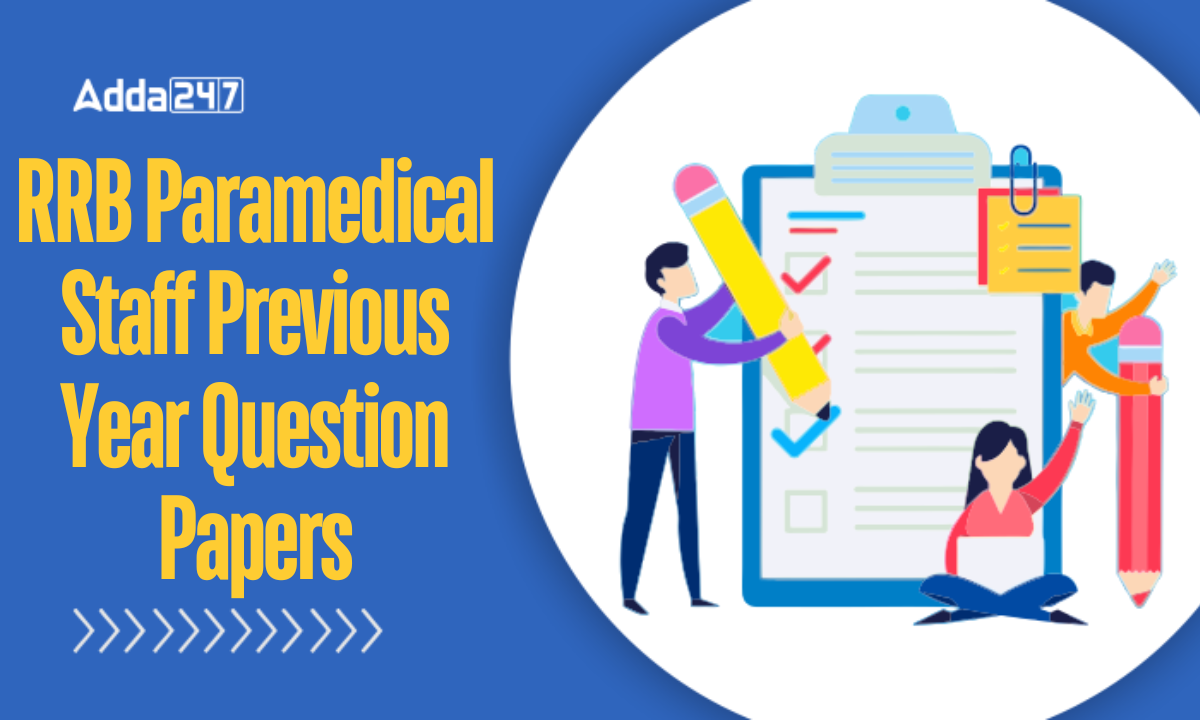


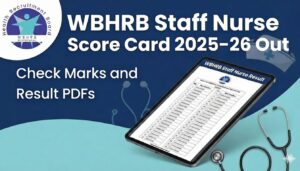 WBHRB Staff Nurse Score Card 2025-26 Out...
WBHRB Staff Nurse Score Card 2025-26 Out...
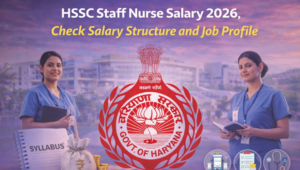 HSSC Staff Nurse Salary 2026, Check Sala...
HSSC Staff Nurse Salary 2026, Check Sala...
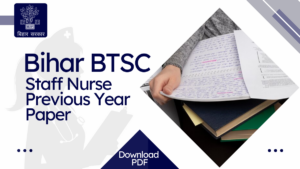 Bihar BTSC Staff Nurse Previous Year Pap...
Bihar BTSC Staff Nurse Previous Year Pap...
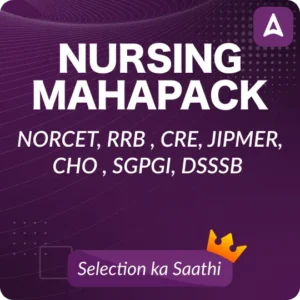
 Adda247 Job portal has complete information about all Sarkari Jobs and Naukri Alerts, its latest recruitment notifications, from all state and national level jobs and their updates.
Adda247 Job portal has complete information about all Sarkari Jobs and Naukri Alerts, its latest recruitment notifications, from all state and national level jobs and their updates.




